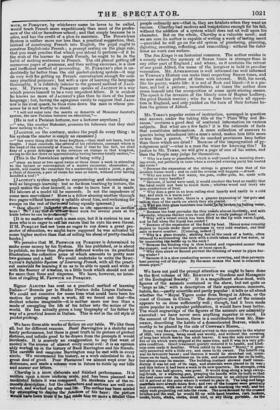We have three able works of fiction on our table.
We like them all, but for different reasons. Basil Barrington is a sketchy and hasty performance, but there is great truth in its picture of genteel distress, and infinite good to be drawn from the precepts it would inculcate.. It is scarcely an ,exaggeration to say that want of money is the source of alniOst every social evil: -it is an opinion ably worked hp in. the history Of Basil Barrington and his friends. • The carelelki and sanguine Barrington -may be met with in every We recommend 'his history, as a work calculated to do a great deal of good. Poi* Floriannel we almost wept over her distresses, and made' a solemn vow in future to tottk up our bills
and answer our letters. •
"Cliartiei is a more elaborate and finished perforinance. It is written uon ii.,thore uniforni.)-Scale, and. has been planned and , meditated" before: it Was composed. Its incidents 'are of the ro- Anantio4Teseription; but the.datiraeteraand'motives are well con- edited, and *Mired up after real life. The author has been misled ' by attempting t& display the'fatahans of • his 'hero.: the picture *paid Inito been truer' if he had ntlide him 110 more a fatalist than people -ordinarily-are—that is, they are fatalists when they want an excuse. Chartley had motives and temptations enough' fin' his lall, without the addition of a system which does not sit well upon his character. But on the whole, Chartley is a valuable novel ; and we are sure its author is capable of writing a work of lasting merit —provided he will go on the old system of pondering, planning, digesting, rewriting, reflecting, and remoulding : without the' labor lime no work can endure.
The Sea Kings is an historical romance. The author resides in a county where the memory of Saxon times is stronger than in any other part of England ; and where, as it contains the retreat of our great Alfred, the name of the lawgiver is held in peculiar veneration. Mr. ATHERSTONE is well informed (as well informed as TURNER'S History can make him) respecting Saxon times, and we now read his picture of -them with interest. Still, his novel, like his poetry, wants life: it is not of flesh and blood—it is a pic- ture, and but a picture ; nevertheless, at times the' author does rouse himself into the composition of some spirit-stirring scenes. The epoch is the invasion of the bloody sons of Ragmar Locibroy, the great Danish warrior ; who for a time bore down all opposi- tion in England, and only yielded on the turn of their fortune be- fore the genius of Alfred.


























 Previous page
Previous page